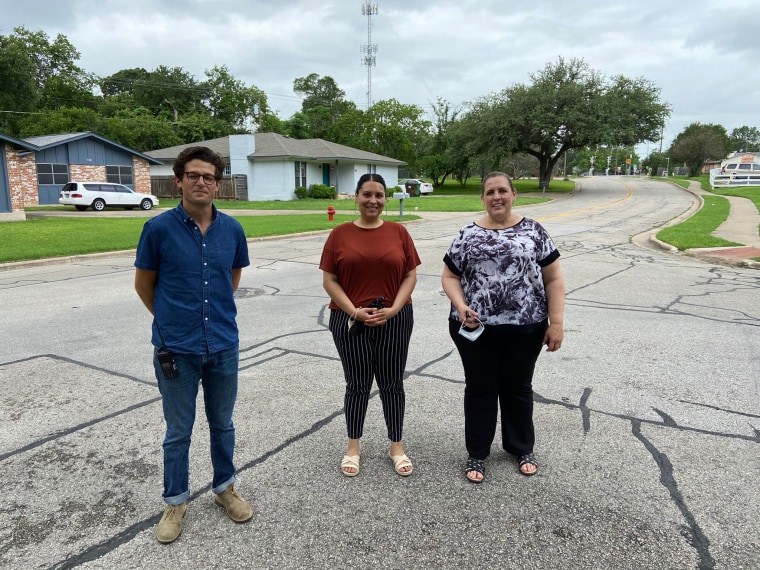In the front seat of a rented Jeep, over a year of waiting was finally coming to an end.
“I have this feeling in my stomach and my heart. I'm excited,” Veronica Ledesma said.
“Like butterflies?” I asked from the back seat.
“Yes, like butterflies.”
I was jammed into the car with Ledesma, an outreach worker for the nonprofit Seneca Family of Agencies, and two of her colleagues, Chandra Allen and Joanna Oyarzabal.
They invited me to join them on a mission that has faded from the headlines but that is as urgent as ever: to track down families who were separated by the Trump administration at the border.
On Tuesday, the Biden administration said more than 2,100 families separated during the Trump administration hadn’t yet been reunited.

For hundreds, even contacting them wasn’t possible. Because of Covid-19, until now, the search has largely been virtual.
But beginning last month in San Antonio, Ledesma and her colleagues were going door to door to find reunified families they hadn’t yet been able to reach — with the goal of offering them mental health services.
A federal judge ordered the outreach because of the “severe mental trauma” of separations, as he put it, and after the Trump administration backed out of a negotiated settlement agreement for the services, as we previously reported.
According to the Biden administration, 1,786 children have been reunified with their parents, largely because of a court order issued during the Trump administration. Some groups say the number may be higher.
So far, mostly through cold calls, Seneca has connected with over 1,000 families, and around 250 have accepted the services, including therapy for parents and children.
Knocking on doors, trying to help
For the Seneca outreach workers, the experience is nerve-wracking, and the stakes are high — and for good reason.
“The work starts with the trauma that they suffered with their separation,” Allen said.
The families' symptoms manifest in different ways, including “parents’ feeling guilty for what happened, not being able to talk to their children about the experience that they went through,” Oyarzabal said. “Depression. Anxiety.”
Those symptoms and others are on a flyer that the team — and other colleagues elsewhere along their route — post anywhere they can, including markets and restaurants. One lead can result in an entire family’s signing up for help.
The group’s main goal was to show up at the doors of over 200 homes to knock directly on doors in the hope that families who hadn’t yet been reached — some for over three years since their separations — would come out.
'My heart is pounding'
At our first stop, a stroke of luck: The mother of a boy who was separated from his dad was home.
“I’m so excited,” Ledesma said after she shared the flyer with the family and got back in the car. “My heart is, like, pounding.”
The woman told the outreach workers that she would be interested in the services they were offering.
“I’m just so happy to be able to see her in person and them see us, that we're real, that we're here to help them,” Ledesma said. “It's just a different — different connection that you make with the families.”
They soldiered on, one stop down, around 199 or so more to go. I sat and watched from the back seat — never getting out, to protect the identities of the families they were meeting and to avoid startling them — as they knocked on door after door with mixed results.
From San Antonio, we traveled to Austin. Before we split up so the teams could cover more ground, I asked Oyarzabal how she and her colleagues remain so optimistic in the face of such a herculean task.
“I think just knowing that there's families we've connected to services that — you know, it's been helping them," Oyarzabal said.
'I don’t want to be separated from him again'
From there, Allen carried on to Houston and then to New Orleans, where we met up with her again, along with two other colleagues, Julissa Acosta and Julieta Ortiz, who operated from the same playbook.
Flyer. Door-knock. Hope.
“It’s working,” Acosta said.
The road trip was a success — over 30 families who hadn't yet been reached were found.
Near Baton Rouge, Louisiana, before we parted ways, they introduced me to Luis and and his son Luis Jr., who were separated for 44 days in 2018.
“When I was in the foster home, we would just talk about when we would reunite again,” Luis Jr. said. “I am so happy to be reunited with him, and I don’t want to be separated from him again.”
I asked his dad why he decided to talk to me and share his story with the public and with Seneca.
“What happened to us was very hard. But because of the organizations and God,” he said, “we are able to do better.”
For more information on nonprofits helping separated families, links are below: